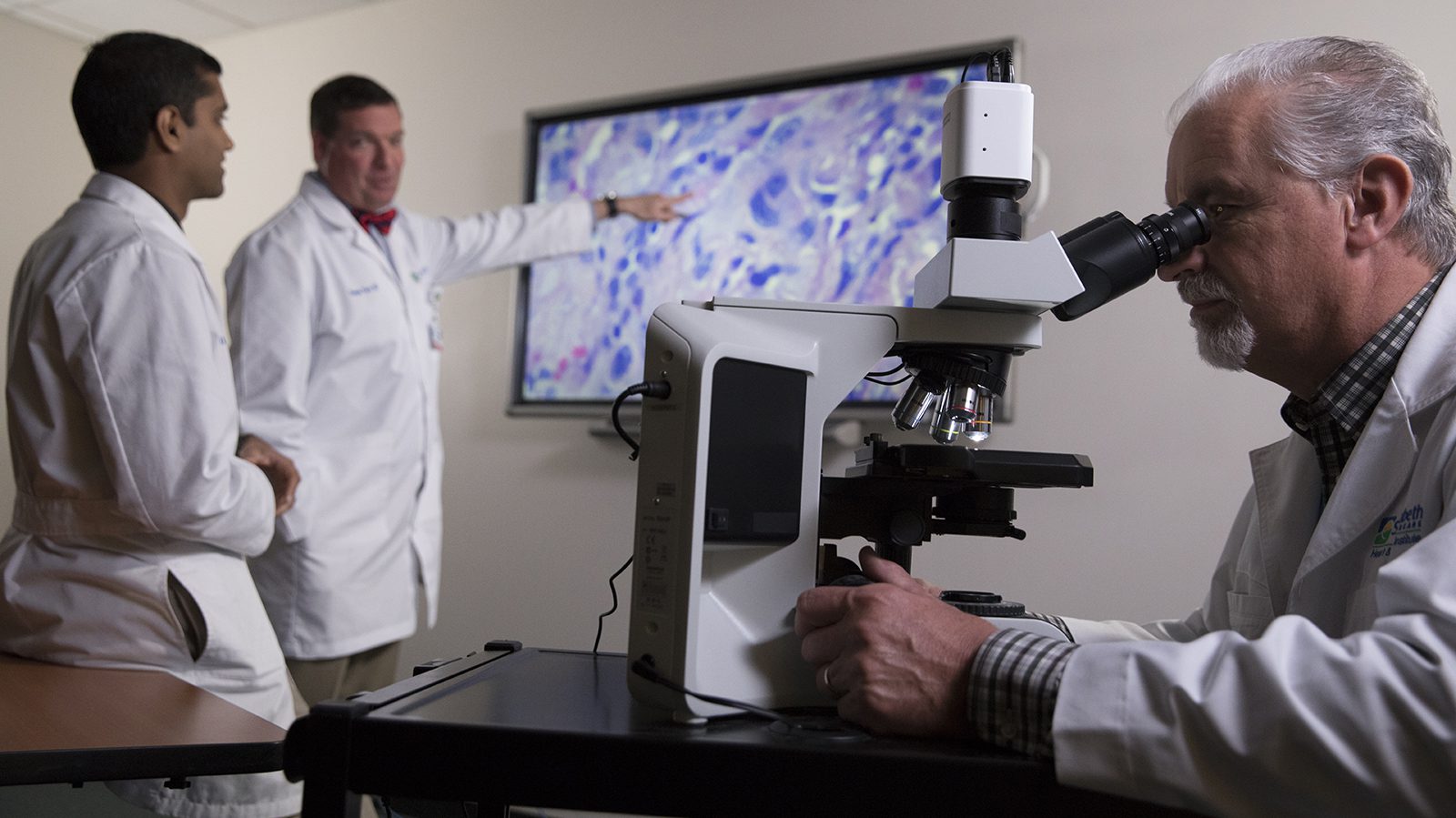Genitourinary Cancer
Cancer is life changing. A diagnosis can leave you with many questions — what’s next, what’s the right treatment path, how will this affect me and so many more. At St. Elizabeth Healthcare, our genitourinary oncology team is here for you – to answer your questions, provide the most effective treatment options and get you on the road to survivorship.
Genitourinary cancers include cancers affecting the male reproductive system and urinary organs. The organs include cancer of the bladder, kidney, penis, prostate, testes, ureter and urethra. These types of cancer have different signs and symptoms. And symptoms are not the same for everyone. At St. Elizabeth, we treat all genitourinary cancers, including:

Make an appointment
For more information, please contact your oncologist or the Cancer Care Center at (859) 301-4000.
Genitourinary Cancer Screening
Regular screenings are one of the most effective weapons in the fight against cancer. They can increase the likelihood of a positive outcome by detecting cancers in their early stages when they are most treatable.
Prostate Cancer Screening
Experts recommend that men discuss screening for prostate cancer with their doctor. According to the American Cancer Society, that discussion should take place:
Genetic Testing for Genitourinary Cancer
If you have a family history of cancer and are concerned about your risk, genetic counseling is an option to consider. It can help determine whether you carry a cancer mutation or gene that increases your risk. St. Elizabeth is the only cancer program in Northern Kentucky that offers a team of on-site genetic counselors.
For patients diagnosed with genitourinary cancer, our hereditary cancer program offers information and resources on inherited disease. Genetic testing can help determine how a cancer will respond to treatment — and allow us to develop a laser-focused treatment plan specific to your cancer cells’ anatomy.
Genitourinary Cancer Diagnosis
Diagnosing genitourinary cancer begins with a thorough physical exam and a review of your personal and family medical histories.
If cancer is suspected, you may require additional testing. These tests include:
Genitourinary Cancer Treatments
The team of cancer experts at St. Elizabeth treats you like the unique individual you are. We work together to develop a personalized treatment plan that addresses every aspect of your cancer and its impact on your life.
Treatment options may include:
Nurse Navigators Help You Move Forward with Confidence
Welcome to the Ice Wolves, the coolest hockey team in town
Our nurse navigators are vital in guiding and supporting you through the cancer treatment journey. With their specialized knowledge and compassionate approach, nurse navigators offer constant assistance, providing valuable information, coordinating appointments and helping to navigate the healthcare system. They offer emotional support, answer questions and address concerns to ensure you feel empowered and well-informed.
By serving as a trusted advocate, nurse navigators steer you through the challenges of cancer treatment, enhancing your overall experience and providing personalized care every step of the way.
Minimally Invasive Robotic Surgery
If surgery is needed, we use the most up-to-date, minimally invasive approaches, including robotic surgery that offers many benefits, such as:
- Less pain.
- Many procedures can be done as outpatient.
- Shorter length of stay in the hospital.
- Shorter recovery.
- Quicker return to everyday life.
Most of our cancer patients require a combination of surgery, chemotherapy and radiation. Our team will create a comprehensive plan based on your needs.
Genitourinary Cancer Surveillance
If your cancer is small and confined to one area, it may not require treatment. The team at St. Elizabeth uses active surveillance for some slow-growing cancers, such as prostate cancer and testicular cancer. We use regular testing and physical examinations to monitor your cancer and whether it’s progressing.
If you do require treatment, our team looks out for you long after your treatment is over. We carefully monitor your condition for at least five years after your diagnosis and adjust your care if we see any indications that your cancer has returned or spread. Our comprehensive surveillance schedule meets your unique medical needs and can include:
- Follow-up visits
- Occupational therapy
- Physical therapy
- Routine testing
- Specialist appointments
- Support group recommendations
Certified oncology data specialists maintain and update our Cancer Registry. St. Elizabeth keeps a record of all the cancer cases we’ve diagnosed or treated since 2000. We use this database to gather vital information, stay on top of trends, measure the effectiveness of different treatments, and gauge cancer’s impact on our community.


